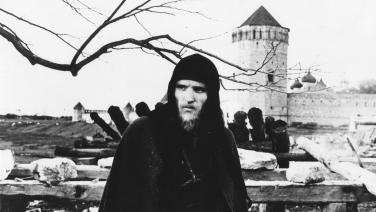
Andrei Rublev, Andréi Tarkovski, USSR, 1966, 205 minutes
A monumental work in the history of cinema, a seminal film, a colossal masterpiece, unmissable, unforgettable ... And we could continue with all the accolades in the world, because the film deserves them and because that is how it has been described at each of its showings since its premiere. But we will say something much simpler: this is the opportunity to see on a cinema screen one of those films that must be seen – and experienced – on the big screen.
The film is based loosely on the life of the monk Andrei Rublev, a painter of Russian icons in the fifteenth century; and it shows with great realism the context of medieval Russia, with its fights between princes and Tartar invasions. And at the same time it is a complete treatise on the figure of the artist and his place in the world.
For several years, Tarkovski and his team immersed themselves in the writing and preparation of the film, studying documents, texts, paintings, sounds and the lifestyles of medieval Russia until they became true experts. But the important thing is the way Tarkovski later transformed all of that into a unique cinematic experience.
The work was premiered – with the direct opposition of the Soviet government – in the Festival of Cannes in 1969 and won the international critics’ prize. Following that presentation, the film and the director suffered direct attacks from the government, which considered that this way of making films was contrary to principles of the Soviet state. The film suffered cuts and several acts of censorship, but quickly became an international point of reference praised by film-makers, viewers and critics all around the world. The copy we present is the director’s original cut as presented at the Cannes Film Festival.
This is the opportunity to see on a cinema screen one of those films that must be seen – and experienced – on the big screen.
